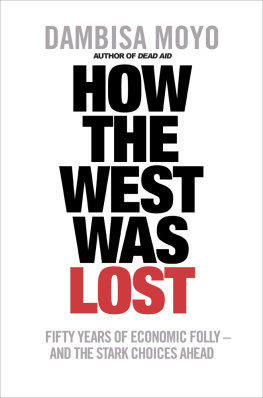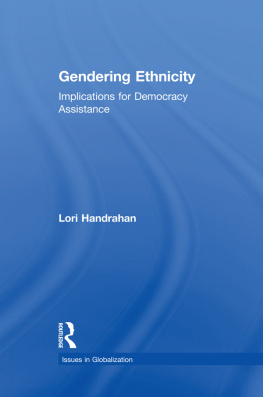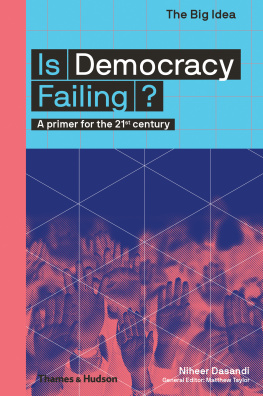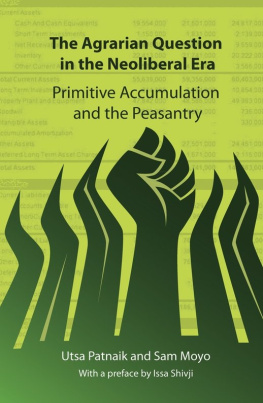Dambisa Moyo - Edge of Chaos: Why Democracy Is Failing to Deliver Economic Growth---and How to Fix It
Here you can read online Dambisa Moyo - Edge of Chaos: Why Democracy Is Failing to Deliver Economic Growth---and How to Fix It full text of the book (entire story) in english for free. Download pdf and epub, get meaning, cover and reviews about this ebook. year: 2018, publisher: Basic Books, genre: Politics. Description of the work, (preface) as well as reviews are available. Best literature library LitArk.com created for fans of good reading and offers a wide selection of genres:
Romance novel
Science fiction
Adventure
Detective
Science
History
Home and family
Prose
Art
Politics
Computer
Non-fiction
Religion
Business
Children
Humor
Choose a favorite category and find really read worthwhile books. Enjoy immersion in the world of imagination, feel the emotions of the characters or learn something new for yourself, make an fascinating discovery.

- Book:Edge of Chaos: Why Democracy Is Failing to Deliver Economic Growth---and How to Fix It
- Author:
- Publisher:Basic Books
- Genre:
- Year:2018
- Rating:4 / 5
- Favourites:Add to favourites
- Your mark:
- 80
- 1
- 2
- 3
- 4
- 5
Edge of Chaos: Why Democracy Is Failing to Deliver Economic Growth---and How to Fix It: summary, description and annotation
We offer to read an annotation, description, summary or preface (depends on what the author of the book "Edge of Chaos: Why Democracy Is Failing to Deliver Economic Growth---and How to Fix It" wrote himself). If you haven't found the necessary information about the book — write in the comments, we will try to find it.
Dambisa Moyo: author's other books
Who wrote Edge of Chaos: Why Democracy Is Failing to Deliver Economic Growth---and How to Fix It? Find out the surname, the name of the author of the book and a list of all author's works by series.
Edge of Chaos: Why Democracy Is Failing to Deliver Economic Growth---and How to Fix It — read online for free the complete book (whole text) full work
Below is the text of the book, divided by pages. System saving the place of the last page read, allows you to conveniently read the book "Edge of Chaos: Why Democracy Is Failing to Deliver Economic Growth---and How to Fix It" online for free, without having to search again every time where you left off. Put a bookmark, and you can go to the page where you finished reading at any time.
Font size:
Interval:
Bookmark:
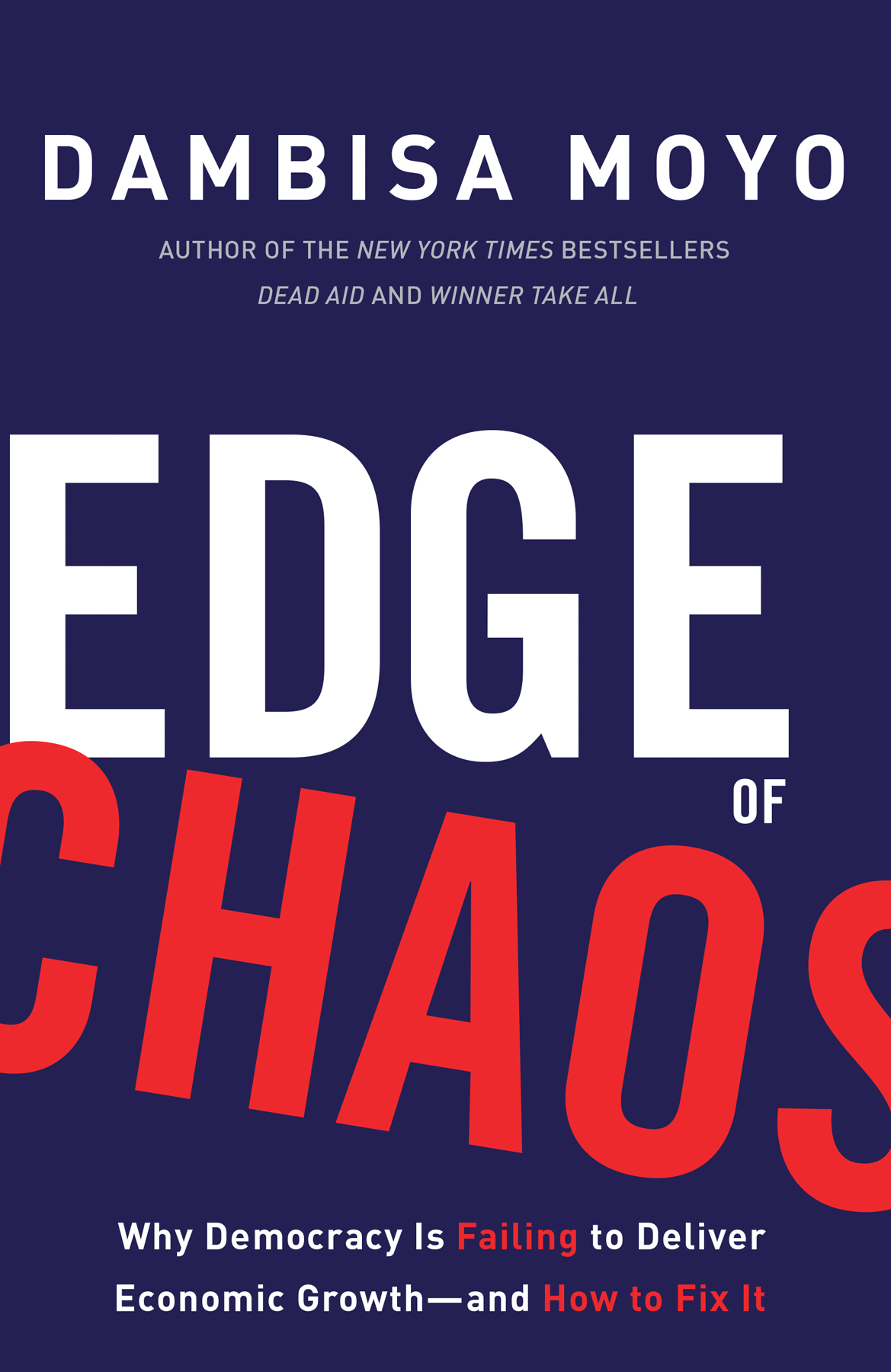
Copyright 2018 by Dambisa Moyo
Hachette Book Group supports the right to free expression and the value of copyright. The purpose of copyright is to encourage writers and artists to produce the creative works that enrich our culture.
The scanning, uploading, and distribution of this book without permission is a theft of the authors intellectual property. If you would like permission to use material from the book (other than for review purposes), please contact permissions@hbgusa.com. Thank you for your support of the authors rights.
Basic Books
Hachette Book Group
1290 Avenue of the Americas, New York, NY 10104
www.basicbooks.com
First Edition: April 2018
Published by Basic Books, an imprint of Perseus Books, LLC, a subsidiary of Hachette Book Group, Inc. The Basic Books name and logo is a trademark of the Hachette Book Group.
The publisher is not responsible for websites (or their content) that are not owned by the publisher.
Library of Congress Control Number: 2018935202
ISBNs: 978-0-465-09746-3 (hardcover), 978-0-465-09747-0 (ebook)
E3-20180307-JV-NF
We all know what to do; we just dont know how to get re-elected after weve done it.
JEAN-CLAUDE JUNCKER,
President of the European Commission
A LMOST THREE DECADES AGO, THE Berlin Wall fell. A period of barely restrained chaos, turmoil, and stagnation across the Soviet bloc had come to an end, and new market capitalist democracies began to emerge not only in the former Soviet sphere but also throughout the developing world, promising economic prosperity and peace for their citizens. Analysts and economists believed the end of communism portended a new era of stability and growth. Yet less than thirty years later, all signs point toward a world once again on the edge of chaos.
Expressions of discontent with the postCold War order have been on the rise, particularly since the 2008 financial crisis. The crisis catalyzed a climate of dissent in the Westthe source of the financial crisisand beyond, in which populist movements challenged leaders and elites, from the Occupy Wall Street protests against inequality and corruption in the United States to anti-austerity marches in Europe and uprisings in the Middle East.
In December 2010, a poor Tunisian fruit vendor named Mohamed Bouazizi lit himself on fire to protest the arbitrary expropriation of his goods and his economic future. Within weeks Bouazizis act of self-immolation precipitated the Arab
Protests have also shaken South America, Asia, Eastern Europe, and Southern Africa, to the extent that by the beginning of 2014 nearly half of the worlds economies (65 out of 150) were expected to be at a high or very high risk of social unrestthe highest rate of risk registered over the past decade.
This wave of rising political anxiety has not been confined to developing nations, as campaigns against austerity, migration, income inequality, and globalization have also gripped developed countries. In November 2014, 100,000 people rioted in the streets, setting fire to vehicles in a march against EU-sanctioned austerityin Brussels! Around the same time, 50,000 demonstrators organized by the Campaign Against a Europe of Capitalism and War swarmed Barcelona in a demonstration against globalization. In July 2016, Meanwhile, the publics revolt against globalization, which many blame for the loss of jobs and the hollowing out of the middle class, culminated in the British vote to exit the European Union and the election of political neophyte and outsider Donald Trump as US president in 2016. Trumps ascendancy, in particular, represented a rebuke of the deeply entrenched political establishment that had dominated US politics for decades.
At a glance all of this global unrest appears disparate; however, these movements are united by a common thread: average citizens expressing anger at the impotence and corruption of the ruling political elites. It is a rebuke of political decisions to embrace trade and internationalism, policies that did not in fact lift all boats as the proponents of globalization promised, but actually harmed the livelihoods of so many. And it is a rebuke of governments failure to create economic growth.
No matter what government does, it seems to fail. This failure is perhaps most worrying in the United Statesthe
The failure is evident across many measures of living standards: in deteriorating real wages, rising poverty rates and worsening poverty statistics, as well as stagnating employment numbers. In terms of income, between 1979 and 2014 the top 10 percent in the United States saw their wages rise by a third, while the median wage rose by just 8 percent and the bottom 10 percent flatlined. Today, twenty million Americans live in extreme poverty, members of one in twelve American households go hungry, and, according to the US Census Bureau, the proportion of US citizens living below the poverty line increased from 11 percent in 2000 to almost 16 percent in 2012.
Worse still, not only are US living standards declining, but also the prospects of achieving social mobility and escaping economic destitution have fallen over time. In the last thirty years the probability has more than halved that an individual born into the bottom 25 percent of the income distribution in the United States will end his life in the top 25 percent. Meanwhile, according to the Pew Research Center, the middle class made up 50 percent of the US adult population in 2015, down from 61 percent in 1971.
Furthermore, American households continue to live a precarious financial existence, making it hard to plan or invest in a more prosperous future. According to US Federal Reserve data, Americans now owe $1 trillion in credit card debt, the highest level since the 2008 financial crisis, and US households owe a roughly equivalent amount in student debt and auto loans. A US Federal Reserve report notes that 47 percent of respondents said they either wouldnt be able to cover an unexpected $400 expense through savings or their credit card, or would have to cover it by selling something or borrowing money. Furthermore, life expectancya barometer of economic and social successhas remained flat for all groups combined from 2013 to 2014, and has actually declined for white American men and women according to a 2016 report.
The confluence of these factors has contributed to the weakening of social cohesion (with rising rates of suicide, drug use, divorce rates, and violence in Middle America), culminating in the erosion of the middle class. It is the disaffected middle class that is at the heart of the rebellion against the political establishment in the United States and beyond.
Against this backdrop, angry voters rebellion against the establishment should have come as no surprise. In the UK referendum, seventeen million voters gave the government the mandate and instruction to leave the European Union after its membership of over four decades. Meanwhile, in the United States, Trumps election was decidedly clear: not only did he win the presidency, but the Republicans held on to majorities in the Senate and the House of Representatives and won many gubernatorial racesan emphatic rebuke of the Democratic status quo. For its part, the US establishment has stressed that while Trump won the Electoral College, Hillary Clinton won the popular vote by nearly three million votes over Trump. However, these aggregated data mask the true disaffection of Americas Rust Belt and the South. After all, if wealthier New York and California are removed from the calculation, it is actually Trump who wins the popular vote by nearly three million votes.
Font size:
Interval:
Bookmark:
Similar books «Edge of Chaos: Why Democracy Is Failing to Deliver Economic Growth---and How to Fix It»
Look at similar books to Edge of Chaos: Why Democracy Is Failing to Deliver Economic Growth---and How to Fix It. We have selected literature similar in name and meaning in the hope of providing readers with more options to find new, interesting, not yet read works.
Discussion, reviews of the book Edge of Chaos: Why Democracy Is Failing to Deliver Economic Growth---and How to Fix It and just readers' own opinions. Leave your comments, write what you think about the work, its meaning or the main characters. Specify what exactly you liked and what you didn't like, and why you think so.

